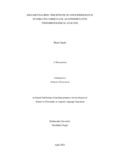
Please use this identifier to cite or link to this item:
https://hdl.handle.net/20.500.14301/293| Title: | ENGLISH TEACHERS’ PERCEPTIONS OF AND EXPERIENCES IN INTEGRATED CURRICULUM: AN INTERPRETATIVE PHENOMENOLOGICAL ANALYSI |
| Authors: | Sigdel, Bharat |
| Citation: | Sigdel,B.(2023).English teachers’ perceptions of and experiences in integrated curriculum: An interpretative phenomenological analysis. |
| Issue Date: | Apr-2023 |
| Department: | DOLE |
| Level: | M.Phil. |
| Program: | Master of Philosophy (MPhil) in English Language Education |
| Abstract: | Following the guidelines of the Curriculum Development Centre (2019) and School Sectors Development Plan (2016-2023) a recent venture into integrated curriculum triggered this study. The study “English Teachers’ perceptions of and experiences in integrated curriculum: an interpretative phenomenological analysis” explored the practitioner English teachers’ perceptions and experiences. Based on the thematic, empirical, methodological, and policy review, the present study has been considered momentous in the current context. This study is qualitative research under interpretivist paradigm. Under phenomenological methodology interpretative phenomenological analysis built its method. With five participants from community schools in Bhaktapur district, the study was driven with Vygotsky’s learning theory of social constructivism. Data was collected through Semi-structured interviews and observations of classroom activities. For meaning making step-by-step analysis as recommended by Smith and Osborn (2015) was carried ahead; superordinate themes were generated with higher abstraction from subordinate themes and emergent theme titles. The analysis embraced six superordinate themes to inform how five participants perceived and experienced integrated curriculum during its implementation. Amid the challenges that caused agitation of adaptation, the participants perceived integrated curriculum as an unavoidable opportunity and realized it as their responsibility. Despite limited understanding of core areas of integrated curriculum, they ventured ahead with self-efforts. They observed transitional roles through mutual help. Though they still adhered to same preceding classroom setups and assessment system, the teachers were hopeful about better impact with integrated curriculum implementation. My findings further indicated that the students were better engaged and new attempts had been made for new pedagogical trends. English teachers were still disciplinarians during implementation of integrated curriculum too. They were happy with changes and were hopeful about achievement of learning outcomes and competencies targeted by the curriculum. The discussion revealed some shortcomings in the effective implementation envisioned by integrated curriculum. Teachers’ feeling of agitation, lack of trainings, limited resources, and same traditional practices of assessment led to the conclusion that expecting much may be overambitious. At this context, some additional efforts of rectification would be worth practising. Effective implementation might persist if the participants’ appeal to training and exposure were heard before it becomes too lat |
| URI: | https://hdl.handle.net/20.500.14301/293 |
| Appears in Collections: | Dissertation |
Files in This Item:
| File | Description | Size | Format | |
|---|---|---|---|---|
| Dissertation.pdf | 664.85 kB | Adobe PDF |  View/Open |
Items in DSpace are protected by copyright, with all rights reserved, unless otherwise indicated.